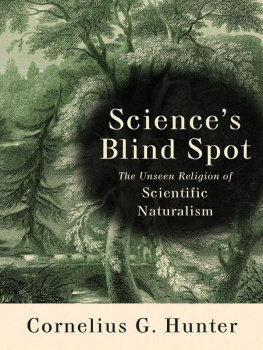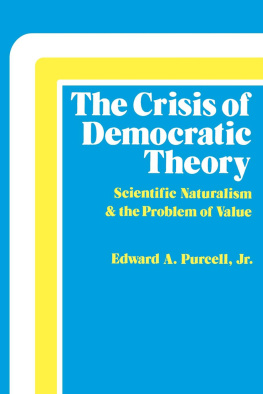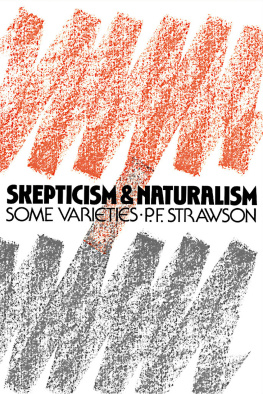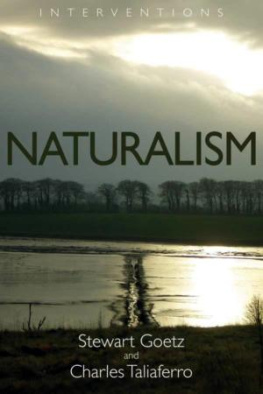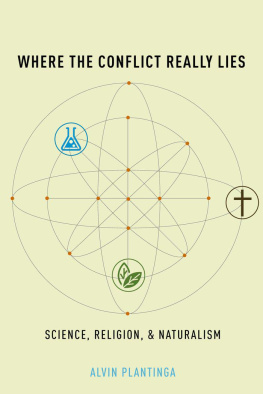
Sciences
Blind Spot
Sciences
Blind Spot
The Unseen Religion of
Scientific
Naturalism
Cornelius G. Hunter

2007 by Cornelius G. Hunter
Published by Brazos Press
a division of Baker Publishing Group
P.O. Box 6287, Grand Rapids, MI 49516-6287
www.brazospress.com
Printed in the United States of America
All rights reserved. No part of this publication may be reproduced, stored in a retrieval system, or transmitted in any form or by any meansfor example, electronic, photocopy, recordingwithout the prior written permission of the publisher. The only exception is brief quotations in printed reviews.
Library of Congress Cataloging-in-Publication Data
Hunter, Cornelius G.
Sciences blind spot / Cornelius G. Hunter.
p. cm.
Includes bibliographical references (p. )..
ISBN 10: 1-58743-170-X (pbk.)
ISBN 978-1-58743-170-8 (pbk.)
1. Religion and science. 2. NaturalismReligious aspects. I. Title.
BL240.3.H86 2007
201 .65dc22
2006029549

Contents
Preface
T his book is about a centuries-old movement in science. Although this movement is tremendously important in todays world, it goes largely unnoticed. It dominates science, and its influence beyond science is far reaching, yet it remains largely unknown to both scientist and lay person alike. This movement goes unnoticed not because it is a secret, but because it is pervasive. There is no single founder, no famous scientist or philosopher to associate with the movement. There is no particular group, nor even label associated with the idea. Rather, it has been held and promoted by a variety of thinkers from a wide range of traditions.
As Alfred North Whitehead once suggested, assumptions and premises that are crucial to a movement are often deemed to be obvious and in no need of justification. These underlying assumptions are unspoken and undefended because, as Whitehead put it, Such assumptions appear so obvious that people do not know what they are assuming because no other way of putting things has ever occurred to them. Whiteheads observation well describes the subject of this book.
Scientific conclusions, which may have implications far beyond the world of science, often depend on deeply held assumptions that would be difficult to defend under close scrutiny. The consequences of this are enormous, for this movement is both profound and yet presumedcrucial and broadly influential, yet taken for granted. We need to evaluate its underlying assumptions because, in many ways, these assumptions are now dictating our thinking. Our conclusions and opinions of today have deep roots.
For this book I am indebted to many people. These include John Bloom, David Snoke, Ken Daniels, and George Murphy for their helpful comments and criticisms. I am, of course, responsible for any errors in the book.
Whats Wrong with Science
O ver the past four centuries science has made wonderful discoveries. It would be a challenge just to document all the ways that science has improved our lives. Science investigates the natural world with great success. It seems to be synonymous with knowledge and truth. Can we even question science? Can there be anything wrong with science? The answer, of course, is yes. Like all endeavors science has its weak points and challenges. It is successful, but it is not perfect. The biggest challenge that science faces stems from religion. The problem is not, as is sometimes popularly held, that religion opposes science. The problem is that religion has joined science.
Religious beliefs and traditions have had profound influences on science, more than is often understood. These influences were important in the early formational years of modern science, and they remain important today. In centuries past the church supported science in several ways. But support does not come without cost. Religious support was accompanied by religious influence, though the connection was sometimes subtle.
Tell me who paid for the scientific research, so goes the old joke, and Ill tell you the results. But there are deeper influences in science than the color of the funding money. Within scientific communities there usually are tacit understandings of what types of results are acceptable and what types are not. Ideally such understandings are merely based on existing knowledge gained the hard wayfrom empirically based scientific work. But too often they are based on accepted norms that are unproved and unquestioned. Research that is bought and paid for by special interest groups is obvious. Religious influences are often less obvious and more pervasive.
The message that religion has been smuggled into science is not common today. Historians take note of the many religious influences in centuries past, but that, we are told, is now all gone. Todays science is thought to be empirical and free of theological premise. It is admitted that individual scientists hold their own religious beliefs. But science itself, according to many commentators, is free of theological guide or constraint. Nothing could be further from the truth.
How We Got Here
There were many religious influences within science in centuries past. In fact, theological concerns often guided and constrained scientific ideas and thought. A variety of such concerns were raised by different thinkers at different times. This makes them both easy to see but not necessarily easy to categorize. These ideas were prevalent but complexthere was no single religious tradition, no single theological concern, no leading thinker or even school of thought at the interface between religion and science. What was the motivation for these religious ideas, how were they related, and, importantly, exactly what influence did these religious ideas have on science?
The answers to such questions are not simple, but on the other hand, they are not beyond our reach. There are strong connections between religion and science, and recurring themes are obvious. Theological premises do not merely suggest possibilities or stimulate thinkingthey are at times crucial in framing scientific thought. This book traces out these connections and their effects.
We begin in chapter 2 with a survey of several common religious influences in the seventeenth through nineteenth centuries. Most of them fall into four distinct categories: greater God theology, religious rationalism and deism, the problem of evil, and theological opposition to miracles. These categories are overarching. None of them represents a single tradition or concern; rather, each arises from a family of similar concerns. And these categories do not capture the totality of religious thought impinging on science. Other concerns that we will see in later chapters include the warning against anthropomorphizing God, the God of the gaps warning, the infinite regress problem, and the intellectual necessity.
This history and framework gives helpful structure to the religion-science interface. As we shall see, these different theological traditions would circumscribe scientific activity by defining what types of solutions were, and were not, acceptable. Indeed, these theological mandates are common in the scientific literature.
There are, as it were, theological ground rules imposed on science. And although these theological concerns are varied, they all funnel toward a similar consequence. Put simply, the primary theological ground rule is that scientific explanations must be purely naturalistic. The term
Next page
